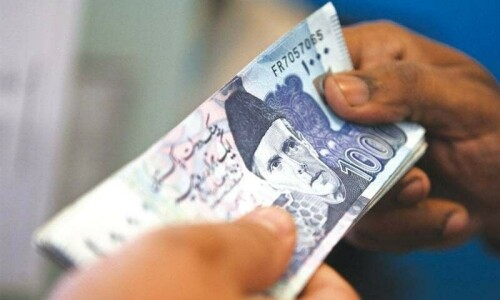 It is agreed on all hands that Pakistan is faced with a serous economic crisis. The difference is on the reasons.
It is agreed on all hands that Pakistan is faced with a serous economic crisis. The difference is on the reasons.
Some, mostly in official quarters, want to link it to international factors, mainly higher prices of fuel and food. This is an oversimplification of a complex situation that has been in the making for quite some time. The external shocks have exposed the basic structural weaknesses of the economy, which may be broadly classified as those pertaining to development strategy, priorities, management and the rampant corruption.
To begin with, the development strategy was devised to be investment-driven relying heavily on external resources. Their contribution is manifold as they support balance of payments position, finance federal budget and help increase national investment. No wonder, the growth rate has moved in tandem with the availability of external resources.
External resources, except for negligible grants, entail cost and are justified only if wisely employed to enhance the productive capacity more than that cost so as to leave something to benefit the population. If not, this becomes a drag on the domestic economy. They are thus justified on the condition that they supplement and not supplant domestic effort for development or domestic saving/investment. Unfortunately, the latter is the case for Pakistan.
External resources have been treated as a substitute for domestic saving and not a temporary supplement. Promotion of domestic saving has never been part of development strategy.
If any thing, the policies have been positively anti- domestic saving. As a result, Pakistan has one of the lowest rates of domestic saving not reflecting the impact of economic growth with greater concentration of income and wealth in the higher income groups with higher known propensity to save.
The nature of the external resources has also changed basically from official loans and those from international financial institutions to foreign investment. This has far reaching implications for recipients. In case of the loans, the liability is pre- determined and known but in the foreign investment case it is not so. If the capital and current return thereon can be freely repatriated, as is legally allow, this exposes the recipient to uncertainty of withdrawal of foreign investment at a ‘ time when the country can ill-afford it. In recent years, foreign investment, both direct and portfolio investment, has assumed significant proportions to rescue as well as upset the economy. .
The Musharraf regime radically changed the growth strategy from investment driven to consumption driven and actively supported it by consumer financing on a massive scale. Consumer financing outstanding shot up from Rs124 billion in FY 04 to Rs367 billion as of December, 2007, a three-fold increase in three years. This is more than twice the bank advances to agriculture, hunting and forestry at Rs156.3 billion on that date. The result is quite obvious in the drop in domestic saving from 18.1 in FY 02 to 16.3 during FY 06 to 16.0 per cent in FY 07 and is estimated at 11.7 per cent in FY 08. Dependence on foreign savings for investment has thus increased from 1.6 of GDP (MP) in FY 5-5.7 per cent in FY 07 and is estimated 7.6 per cent in FY 08.
External resources have helped investment but the rate remains much below the minimum considered necessary for sustainable growth. National investment in current terms improved from 16.8 of GDP (MP) in FY 02 to 22.9 per cent in FY 07 but dropped to 21.6 per cent in FY 08. In constant terms, the ratios for gross fixed capital formation (GFCF) in private, public and general government sectors have been 15.8, 17.8 and 17.3 per cent. respectively. Even so investment is more consumption rather than production-oriented. Palatial offices and residential buildings, multi-storeyed air conditioned commercial plazas, bullet proof extremely expensive cars, aircrafts for VIP travel would count as investment but have little impact on public welfare.
As to the priorities, industry has been the focus of attention and agriculture has been practically neglected. Whatever is done for that sector stops at the doorstep of the big farmers leaving in the cold the small farmers who are the real backbone of agriculture. Industry is urban based with diversified economic interests and tremendous political and administrative clout to pre-empt all facilities. They are farmers as well as owners of sugar and textile mills. Whatever, they might lose in the price of sugar cane and raw cotton, they more than make up in the price of sugar and textiles.
It is a shame that a basically agriculture country, which was self- sufficient a few years back, now imports, cotton, wheat, pulses, potatoes, onions, tomatoes, etc. and is faced with a serious wheat crisis. The growth rate for agriculture declined from 6.5 in FY 05 to 3.7 in FY 07 and is estimated at 1.5 per cent for FY 08. The rate for major crops fell from 17.7, to 8.3 and 1.5 per cent, over these years.
Engaging in real productive activity not only brings wealth to the entrepreneur, but also makes the country economically strong and prosperous. Otherwise, individual may become rich but the country remains poor and the common man has to be content with low standard of living. There was a genuine productive activity to give a purely agricultural country an industrial base. For quite some time, the pace of new industrial investment has slackened, if not practically stopped and textile industry remains the main venture attracting it mainly for balancing and modernisation of old units.
In the current market prices, the ratio of GFCF for the private sector declined from 25.2 per cent in FY 00 to 20.2 in FY 07 and 19.3 per cent in FY 08. In constant terms, the ratios were 27.2, 20.1 and 19.3 per cent. In fact, the absolute investment in the last year increased by 0.9 against 10.4 per cent in the preceding year. The large scale industry investment declined by 3.3 in contrast to an increase of 3.2 per cent in the preceding year.
It is easier and safer to acquire wealth through devious means than to face the problems of management of business,. particularly in the industrial sector. There is quite a variety of such means in the form of corruption such as sale of sub-standards goods and services at the price of standard one, over and under-invoicing of foreign trade, tax evasion, financial scams, loan writ off, smuggling, both commodities and human beings, land grabbing, patronising if not actually managing, mafias extorting protection money from the hapless public and engaging in daylight robbery, kidnapping for ransom, speculation, mainly in real estate, commodities and at the stock exchange, etc. All this means diversion of energy and resources away from productive economic activity where the cost of doing business has become quite exorbitant for a new comer with no contacts who may dare to enter industry.
In a new environment of globalisation, removal of import quotas along with practically scrapping of tariff, indicates a lack of adequate attention to expansion and improvement in quality of industrial output and hence the inability to compete in intensely competitive world markets is proving difficult and costly. In fact, this has been a case of benign neglect of WTO obligations by government as well as the exporter. No wonder, exports are lacklustre. Industrialists used to exploiting a highly protected domestic market and assured access for exports under quotas feel ill at ease facing increasingly competitive world markets after 1st January 05. .
Fiscal operations of government, for their size, are a major determinant of economic situation and federal budget is of crucial significance. The budget is based on “cash” basis, that is cash received and paid. In order to show a good picture at the end of the fiscal year or on other specific dates, there is lot of manipulation on both receipt and expenditure sides.
There is lot of arm twisting to seek advance tax and withholding of refunds and rebates to achieve the revenue targets while payments are delayed. The latter has given rise to a huge “circular debt” in the public sector and this divorces the fiscal operations, as reflected in budgets, from the real economy that is the actual use of goods and services.
Recent large payment of arrears of some Rs100 billion by the federal government to oil companies, mainly to PSO who, in return, paid the oil refineries is indicative of that phenomenon. Explicit liabilities cash flow streams from the federal budget have gone up from Rs16.2 billion in FY 06 to Rs63.1 billion. Contingent liabilities of the federal government have meanwhile gone up from Rs69.9 billion to Rs156.2 billion. The budget has become more an exercise in public relationing than an effective tool of management. Among other things, supplementary budgets are an eloquent proof of that.
The assessment of the State Bank is that the budget overstates revenue and understates expenditure. In fact, no one in government has any idea about the amount due as arrears by the public sector, much less its net worth.
The experience of the FY08 federal budget confirms the SBP’s observations. A few large variations may be pointed out. Total expenditure was budgeted at Rs1,555 billion but according to revised estimates, it turned out to be Rs1,948 billion, an excess of 25.3 per cent. Current expenditure was budgeted at Rs1,056 billion but this was Rs1,516 billion, as per revised estimates, an excess of 43.6 per cent.















































Dear visitor, the comments section is undergoing an overhaul and will return soon.